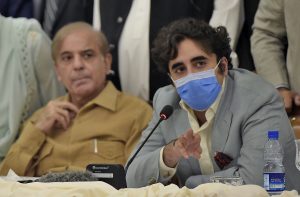A little more than a month and a half after it was formed, the 11 opposition parties’ Pakistan Democratic Movement (PDM) is beginning to show cracks. In an interview with BBC Urdu on November 6, Pakistan Peoples Party Chairman Bilawal Bhutto-Zardari claimed he was “shocked” to hear alliance partner Nawaz Sharif, the leader of the Pakistan Muslim League-Nawaz (PML-N), name the army chief, General Qamar Javed Bajwa, and chief of the Inter-Services Intelligence Lieutenant General Faiz Hameed as being behind Prime Minister Imran Khan’s 2018 election at a rally last month. Reporting on the interview, the Dawn quotes Bhutto-Zardari as saying “it was a shock for me because, typically, we don’t talk like this at rallies. But Nawaz heads his own party and I can’t control what he says, just like he can’t control what I say.”
Sharif’s daughter and PML-N leader Maryam Nawaz, in a separate rally at Quetta on October 25, had doubled down on her father’s remarks and called for the resignation of the “selectors” of Khan, in a reference to Bajwa and Hameed – an unprecedented demand in the political history of Pakistan – and not just Khan’s. “Let me make this clear that this (resignation of military leadership) is not a part of our demands and does not reflect our position,” Bhutto-Zardari told BBC Urdu, according to the Dawn.
With Bhutto-Zardari’s clear dissociation with the Sharif statements, the fate of the PDM now looks bleak. Observers had noted that what made the PDM thrust uniquely different from past opposition movements in Pakistan was that there seemed to have been a concerted, unified demand from the opposition parties for accountability from the country’s powerful security establishment – and not just a push to remove Khan from office. But with Bhutto demolishing that key feature of the opposition movement, the PDM now has been reduced to a motley crew demanding Khan’s ouster even when each individual party – whether that be the PPP or PDM leader Fazlur Rehman’s Jamiat Ulema-e-Islam (F) – jockeys for power in case the military dispenses with the Khan government, finding it a liability to the security establishment.
In that scenario, Bhutto and his party assume pole position for the next government in Islamabad, if the military was to seek a face acceptable both at home and abroad; Rehman, a firebrand Islamist, is unlikely to be its choice especially considering potential international backlash. Meanwhile, as The Diplomat’s Pakistan correspondent Umair Jamal has written, “after the Quetta rally, it is hard to imagine how the Pakistan Muslim League-Nawaz (PML-N) will ever again come to power at the provincial level in Punjab or rule the country from Islamabad.” Beyond political considerations, the fate of Maryam Nawaz and other PML-N party leaders remains uncertain. Should yet another army-backed government to come to power, or Khan retains his position with tacit support from Bhutto-Zardari and Rehman, it is not clear whether Maryam Nawaz will be imprisoned or allowed to go into exile, like her father before. (Nawaz Sharif himself has been in London for the past year and has been addressing rallies virtually.)
Much dust needs to settle still before we have answers to these questions – or even a sense of how the PDM cookie will ultimately crumble. But for now, Bhutto-Zardari’s apparent volte face suggests that the security establishment’s sway over the country’s political scene remains unchallenged.













